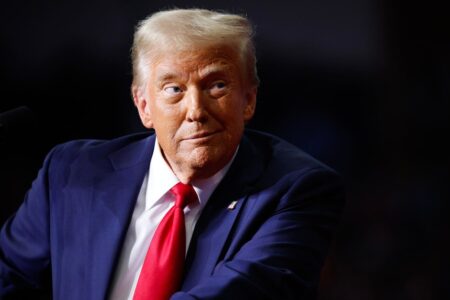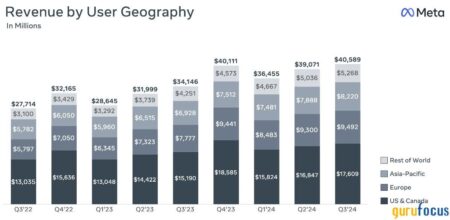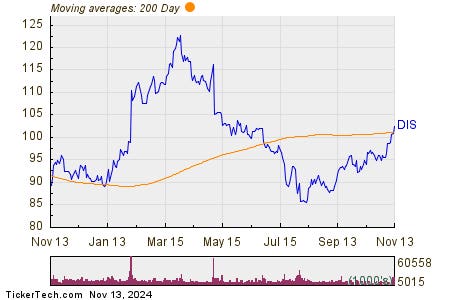JD.com Earnings Overview
E-commerce giant JD.com reported its Q3 financial results after the close in Hong Kong. The results largely exceeded analysts’ expectations. In the press release, CEO Sandy Xu commented that the company is benefiting “as overall consumer sentiment continued to brighten.” JD is a direct beneficiary of government subsidies for home appliances, serving as the online “Best Buy of China.”
CFO Ian Su Shan commented that “China’s government-backed trade-in programs in over 20 provinces and cities…have been launched on JD.com”. He also commented on the rise in revenues “resulting from a rebound in growth of electronics and home appliances”. On the earnings call, when asked about the program, CEO Xu stated that “the full potential of the trade-in policy has yet to be fully realized in Q3 because some of the consumers haven’t been fully aware of this policy”.
Xu also commented on the economy: “At the recent National People’s Congress meeting; the government just unveiled a more forceful fiscal stimulus plan based on next year’s economic and social development objectives and expanding the Trade-In Program in greater scale and categories of consumer goods, a measure included in this supportive plan. We believe expanding the Trade-In policy would further support consumer spending.” When asked again about the macroeconomic policy measures, CEO Xu stated, “Current macro policies have been having a positive effect on the overall consumption sentiment, and we expect that, as these policies continue to take effect, this will help to improve the economic fundamentals and to help recover and improve household income, which will all provide more energy and to the consumption potential.”
The company announced a new, ambitious stock buyback program totaling $5 billion after repurchasing an impressive 8.1% of shares outstanding (15.5 million ADRs), year-to-date. Hat tip to management for their shareholder friendliness!
% changes are year-over-year (YoY) as of 9/30/2024 unless otherwise indicated
- Revenue increased 5.1% YoY to RMB 260.4B ($37.1B) versus an estimated RMB 259.7 and Q3 2023 RMB 247
- Adjusted Net Income increased 23.9% to RMB 13.2B ($1.9B) versus an estimated RMB 11.3B versus Q3 2023 RMB 10.64B
- Adjusted EPS increased 29.5% to RMB 8.68 ($1.24) versus an estimated RMB 7.41 versus Q3 2023 RMB 6.70
- The Company repurchased 1.1% of its shares, totaling approximately 31.0 million Class A ordinary shares (equivalent of 15.5 million ADSs) for a total of approximately US$390 million during the three months ended September 30, 2024.
- The Company repurchased 8.1% of its shares, totaling approximately 255.3 million Class A ordinary shares (equivalent to 127.6 million ADSs) for a total of approximately US$3.6 billion during the nine months ended September 30, 2024.
- The Company announced it may repurchase up to $5.0 billion worth of its shares (including ADSs) over the next 36 months through the end of August 2027.
NetEase Earnings Overview
Online gaming company NetEase missed analyst expectations. The company’s press release made precious few comments on the miss, which contrasts with gaming giant Tencent’s stellar results in the third quarter. However, a new $5 billion share buyback is good news.
- Revenue decreased -3.9% YoY to RMB 26.2B ($3.7B) versus an estimated RMB 26.5 and Q3 2023 RMB 27.27B
- Adjusted Net Income increased 23.5% to RMB 7.5B ($1.1B) versus an estimated RMB 7.9 versus Q3 2023 RMB 8.65B
- Adjusted EPS RMB 11.60 ($1.67) versus estimate RMB 12.23 versus Q3 2023’s $1.92
- As of September 30, 2024, approximately 18.2 million ADSs had been repurchased under this program for a total cost of $1.6 billion.
Bilibili Earnings Overview
Online video company Bilibili beat analyst expectations. In its third-quarter results. The company had a great quarter, as daily and monthly active users “hit record highs of 107 million and 348 million,” according to Chairman and CEO Rui Chen. Mobile game revenue jumped +84% YoY though I like that advertising revenue was up +28% YoY, as advertisers don’t advertise if no one is buying!
Management had the following to say regarding the macro economy. ” We are very pleased to see a series of positive economic policies being introduced; we view this policy as highly encouraging signals that reflect the government’s commitment to economic growth. While some of these policies are still in the pipeline and might take time for their effects to materialize, we think it’s just a matter of time as the overall direction has been set.”
- Revenue increased by 26% YoY to RMB 7.31B ($1.041B) versus an estimated RMB 7.1B and Q3 2023 RMB 5.8B
- Adjusted Net Income increased to RMB 235mm ($33.6mm) versus an estimated RMB 217mm versus Q3 2023 loss of RMB -863mm
- Adjusted EPS increased to RMB 0.57 ($0.08) versus an estimated RMB 0.53 versus Q3 2023 loss of RMB -2.12
- The Company announced today that its board of directors has authorized a share repurchase program under which the Company may repurchase up to $200 million worth of its publicly traded securities for the next 24 months.
Key News
Asia had another rough night, as the wrecking ball of US dollar strength came back as some expressed trepidation over hardliners joining Trump’s cabinet.
We continue to believe that Trump’s main goal in international relations is to negotiate and reach better terms with China, and others, especially on trade. If you are going to negotiate, you need someone to play bad cop, right? That could explain the nomination of Marco Rubio, a well-known hawk, for Secretary of State. This follows the playbook from the last administration. Imagine the Iranian delegation when John Bolton walked into the room!
Mainland China was not immune to declines this time around, as some profit taking took place. Meanwhile, the Mainland’s weakness took the wind out of Hong Kong, which dropped during the trading day.
Tencent was off only -0.1% versus its unsponsored US-listing (ADR), which fell -1.78% yesterday. Tencent’s Hong Kong share class trades more than 877% more than the unsponsored ADR in New York, which is why we own the former and not the latter.
The only bright spot overnight was Mainland investors’ net purchase of $2.53 billion worth of Hong Kong-listed shares, as growth and internet stocks saw healthy inflows. This week alone, Mainland investors have bought $4.4 billion worth of Hong Kong-listed stocks and ETFs.
The Mainland-listed ETFs favored by the “National Team”, a conglomeration of funds associated with China’s sovereign wealth, had another light volume day, indicating a lack of support.
The Hang Seng and Hang Seng Tech indexes fell -1.96% and -3.08%, respectively, on volume that declined -6.15% from yesterday, which is 137% of the 1-year average. 58 stocks advanced, and 445 stocks declined. Main Board short turnover increased by +15.44% from yesterday, which is 142% of the 1-year average, as 16% of turnover was short turnover (Hong Kong short sale turnover includes ETF short volume, which is driven by market makers’ ETF hedging). The value factor and large caps fell less than the growth factor and small caps. All sectors were negative, led lower by Real Estate, which fell -4.50%, Materials, which fell -4.44%, and Technology, which fell -3.92%. All subsectors were negative, led lower by capital goods, semiconductors, and technical hardware. Southbound Stock Connect volumes were 2X the average, as Mainland investors bought a net $2.53 billion worth of Hong Kong-listed stocks and ETFs, including the Hong Kong Tracker ETF, which was a massive net buy, Tencent, Meituan, Fourth Paradigm, Alibaba, Xiaomi, and Sunac.
Shanghai, Shenzhen, and the STAR Board fell -1.73%, -2.81%, and -3.21%, respectively, on volume that declined -8.46% from yesterday, which is 195% of the 1-year average. 408 stocks advanced, while 4,679 stocks declined. The value factor and large caps fell less than the growth factor and small caps. All sectors were negative, led lower by Technology, which fell -4.24%, Real Estate, which fell -3.28%, and Health Care, which fell -2.77%. The top-performing subsectors were retail, healthcare, and household products. Meanwhile, aerospace, education, and insurance were among the worst-performing subsectors. Northbound Stock Connect volumes were high, at nearly 2X the average. CNY and the Asia Dollar Index fell versus the US dollar. Treasury bonds rallied. Copper and steel fell.
New Content
Read our latest article:
KBA
KraneShares Bosera MSCI China A ETF
Please click here to read
Last Night’s Performance
Last Night’s Exchange Rates, Prices, & Yields
- CNY per USD 7.24 versus 7.23 yesterday
- CNY per EUR 7.63 versus 7.64 yesterday
- Yield on 10-Year Government Bond 2.08% versus 2.09% yesterday
- Yield on 10-Year China Development Bank Bond 2.15% versus 2.14% yesterday
- Copper Price -1.45%
- Steel Price -0.54%
Read the full article here











